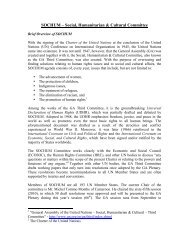Métis/Mulâtre, Mulato, Mulatto, Negro, Moreno, Mundele Kaki, Black
Métis/Mulâtre, Mulato, Mulatto, Negro, Moreno, Mundele Kaki, Black
Métis/Mulâtre, Mulato, Mulatto, Negro, Moreno, Mundele Kaki, Black
You also want an ePaper? Increase the reach of your titles
YUMPU automatically turns print PDFs into web optimized ePapers that Google loves.
P1: GIG<br />
PB371A-06 PB371-Hintzen-v1.cls July 13, 2003 12:47 Char Count= 0<br />
<strong>Métis</strong>/<strong>Mulâtre</strong>, <strong>Mulato</strong>, <strong>Mulatto</strong>, <strong>Negro</strong>, <strong>Moreno</strong>, <strong>Mundele</strong> <strong>Kaki</strong>, <strong>Black</strong>, ... . 89<br />
Jean Muteba: So, our mother wasn’t the first black woman with whom you had<br />
an affair . . . ?<br />
Jean Sr.: No, no, no. She came into my life much later. I met her when I began<br />
the sawmill project along the Kasai River. No, obviously, I had girlfriends before.<br />
But it was without any consequence, no child, and no disease, nothing at all....<br />
Jean Muteba: Yes, but how did you feel in these relationships with black women,<br />
in the context of the colonial society of the Belgian Congo, which was after all<br />
based on segregation? With these relationships you were trespassing a border,<br />
weren’t you?<br />
Jean Sr.: The border, you could trespass it temporarily if you had a ménagère, as<br />
we called them. A ménagère was a black girl who lived with you, generally. This<br />
was particularly the case for the Belgians who lived in a far away place in the<br />
bush, like us. We sometimes found them in the tribe in which we were working,<br />
or in a neighboring tribe, or in the family of one of our workers.<br />
Jean Muteba: How did you get these women to come to your place? How did<br />
their families react?<br />
Jean Sr.: It was exclusively for sexual intercourse that at firstwelookedforthem.<br />
Then, if you got along well with her it lasted longer. The families accepted that<br />
very well. The only problematic thing was to try to seduce the wife of one of the<br />
Africans. In that case, it could even become violent, or else they were going to<br />
complain to the agent who represented the Belgian state in the district in which<br />
you lived. Most of the time, that agent also had a ménagère. Then, he had to<br />
intervene. He had a lot of reasons for doing so. First of all, he had to administer<br />
justice. He played the role of mediator, let’s say.Tobeinconflict with a jealous<br />
husband who was living in one of the villages in which you worked was very<br />
bad for the job, even worse it if he was one of your workers. No, that, you had<br />
to avoid it at any cost. In any case, the choice of available African women was<br />
varied enough to be able to avoid that kind of situation.<br />
Jean Muteba: Yes, but... what kind of relationship did you have with these<br />
women? Was it really only sexual?<br />
Jean Sr.: Some of these women who were quite... let’s say... very attractive,<br />
were also not entirely stupid. That is why we chose more willingly girls who were<br />
in the process of evolution; that is to say that with these there were possibilities<br />
of contacts that did not exist with a savage girl who, for instance, didn’t know<br />
anything else than the customs of her tribe. In that case, the dialogues were quite<br />
poor. . . . They lived with their white man. Usually, they had, near the white man’s<br />
house, their small kitchen that the white man had had his boys construct, so that<br />
she could cook her own meals. But the white man, in general, and that was my<br />
case, had his boys to cook for him. It was a regime of separated kitchens! Why?<br />
Because... shecookedherownmeals. I bought her fish, game meat when there<br />
was some, and things of the sort. Some had already lived near or with a white<br />
man before and could, for instance; make bread and other things. But if not,<br />
that was it. The boys were there. The boys were guys who had gotten some style<br />
from previously working for another white man. But it was rare that you could<br />
find somebody like that in the bush.<br />
In another conversation, while he was explaining to me the circumstances<br />
of the birth of his first child—my brother Philippe—I went back to the issue

















